Standing next to a walk-in refrigerator that held plastic bins packed with perishable food, entrepreneur Adriana Jaramillo was still in disbelief as she recalled the tense Saturday afternoon when she and her fellow Pilotworks members were asked to leave the premises.
“I understand they don’t have money, I understand they have to close the business. Why I’m mad, is the way they did it,” says Jaramillo of the owners of Pilotworks, the commercial kitchen billed not long ago as a “WeWork for food startups,” which housed an estimated 175 small companies.
Given that the company had raised $13 million in venture-capital funding only last December from big-name companies like Campbell’s Soup, the fall of Pilotworks was not only sudden but mysterious. On the afternoon of Oct. 13, the company’s director of operations, Tessa Price, entered the second-floor, 10,000-sq.-ft. kitchen and ordered the members on hand to leave, according to Jaramillo.
“She said you have two hours to pack everything … and if you don’t go easy, we call the police,” says Jaramillo, a 57-year-old immigrant from Colombia. With their paid membership to the Pilotworks community kitchen—about $5,000 a month, which bought them 40 hours a week of kitchen time—Adriana and her son Sebastian had been able to run their own Latin-cuisine catering company called Mi Casa Foods.
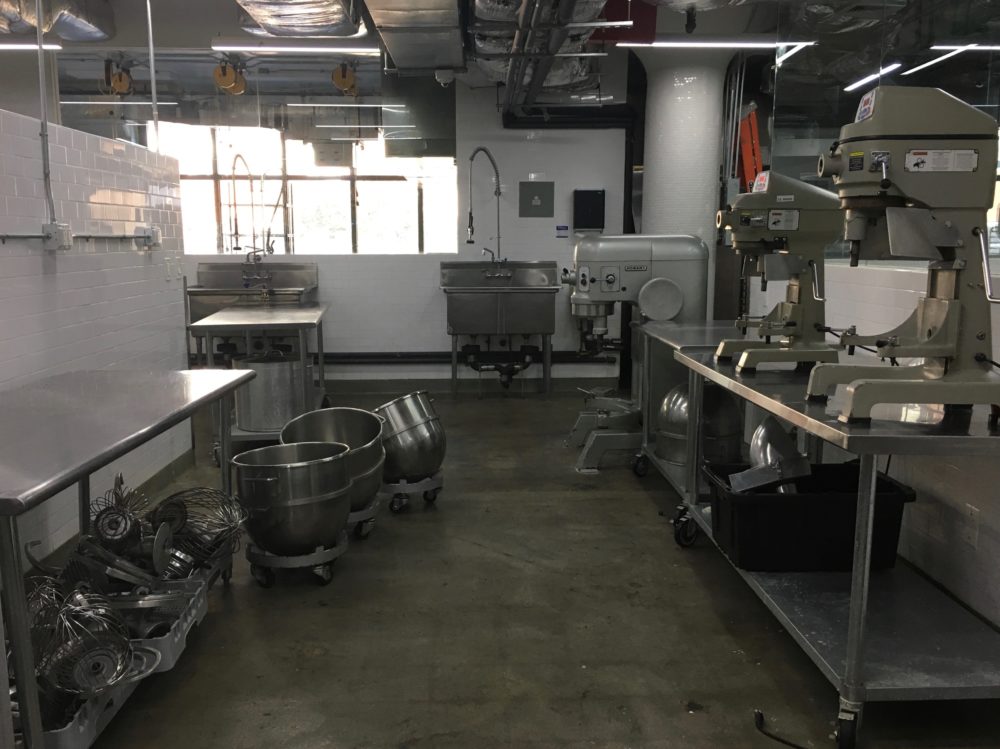
By last week, members had hauled away their raw materials and left only idle equipment (Photo by Michael Stahl)
Adriana says Price was “very mean” and “rude” as she spoke to the other members, who at that point had received no prior notice of the kitchen’s shutdown. An email would be sent to all Pilotworks members at 6:42 p.m., informing them that the company was out of business. The members had until the following Wednesday afternoon to clear out their belongings. Several members told The Bridge that less than a week earlier they had paid a month’s rent, which could run between a few hundred and a few thousand dollars.
On the final day they’d be allowed to fetch their stored food—frozen beef, boxes of bananas, trays of carrots, containers of chopped celery, and much more—Adriana and a tiny contingency of her dazed small-business colleagues were gathering what they could, frantically looking for alternative kitchens, and angrily questioning how the company could have mismanaged its money so badly.
Given that $1.3 million in public funding was spent on the company’s initial startup, elected officials wanted to know too, calling for an investigation into the collapse. Based on interviews with members and former employees, The Bridge offers an emerging picture of how a venture with so much momentum suddenly came to a halt.
A Duo In Search of a Killer Idea
As of January 2017, the principal owners of Pilotworks were Nick Devane and Mike Dee, close friends in their 20s who had yearned to find the right startup idea. About the time they finished college in 2013 (Wesleyan and Georgetown, respectively), the duo started Grazer, an app that allowed home cooks to make money cooking meals for their neighbors. The idea was that it wold create “a marketplace for homemade food” and a community among chefs and customers.
The bootstrapping entrepreneurs—Dee was sleeping on Devane’s couch at the time—also opened Zulu’s Coffee Shop, an all-cold-brew establishment on Manhattan’s Lower East Side. Both companies quickly folded, but after connecting with Alex Iskold, managing director of the New York City branch of Techstars, a network offering mentorships and investment capital to startups, Devane and Dee were admitted into a program for developers-in-residence.

Nick Devane was the company’s co-founder and the CEO until he stepped down in June (Photo courtesy of Pilotworks)
Utilizing what they learned in Techstars in the summer of 2015 and, according to an interview with Devane, getting a $120,000 investment from Iskold, the duo re-launched Grazer, re-branding it as “Homemade” and promoting it as “the Airbnb for cooking.” (Shortly thereafter, the pair were also given a $100,000 convertible note from Right Side Capital Management.)
But Homemade didn’t last long either, partly because it is illegal to sell food without appropriate permits in New York State, which some of the app’s household chefs hadn’t obtained. (Devane also claimed in Fast Company that Homemade went under because production was limited and chefs frequently broke off to start their own operations.)
After shuttering Homemade, Devane and Dee used leftover proceeds to buy a subsidiary of another floundering company called Dinner Lab, which produced one-off dining events in various cities around the U.S. and, according to a Forbes story in May 2016, “blew through $10 million.” Dinner Lab was the operator of Brooklyn FoodWorks, a “licensed shared kitchen and culinary incubator,” which had opened in an old Pfizer pharmaceutical plant at the base of the Broadway Triangle in Bedford-Stuyvesant in February 2016.
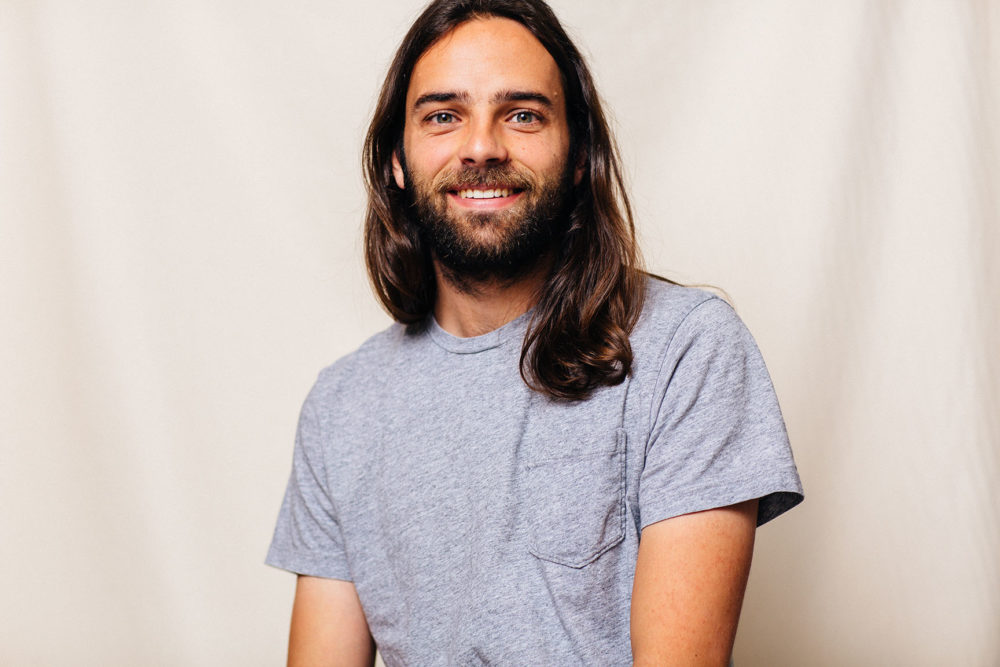
Mike Dee, co-founder of the company, served for a time as chief technical officer (Photo courtesy of Pilotworks)
That venture had been made possible in part by $1.3 million in funding from the New York City Economic Development Corp. (NYCEDC), allocated with the blessing of Brooklyn Borough President Eric Adams and City Council Member Robert Cornegy Jr., who represents the district where the Pfizer building stands.
“The incubator will provide various personalized business mentorship and programming offerings designed to address crucial aspects of creating sustainable businesses, including branding and marketing, product liability and insurance, early stage financing, and distribution,” said an NYCEDC statement announcing the Brooklyn FoodWorks founding. “Additionally, Brooklyn FoodWorks will be a home for local food discussion and innovation and will host a variety of regularly-scheduled networking events, tastings and social gatherings that will be open to the public.”
Over time, the space became a welcoming hub for small businesses run by women and minorities, which made up the majority of its members, and helped make the Pfizer building a hub for food-and-beverage startups. Purchased in 2011 by Acumen Capital Partners, which did not respond to a request for comment, the refurbished Pfizer building became home to the likes of McClure’s Pickles, Brooklyn Soda Works, and other food-industry up-and-comers.
Devane and Dee eventually shortened the venture’s name to just “Foodworks” and later “Pilotworks” as they launched a plan to rapidly scale up by opening outposts around the U.S., fueled by more than $15 million in total venture capital, acquired from around 20 investors over four rounds of fundraising. The two became stars of the startup world, recognized on Forbes’s 30 Under 30 list last year.
In September 2016, Pilotworks acquired an incubator kitchen in Portland, Maine, followed by a grand opening in Providence 15 months later. Then, within the first five months of 2018, Pilotworks accelerated its growth by opening kitchens in Dallas, Chicago and Newark.
But now all but the Portland kitchen, which reopened under new management, are gone.
A Yen for Spending
Standing in the empty kitchen last week, one member who didn’t wish to give his name pointed to a piece of new equipment, a top-of-the-line commercial blender/mixer he said cost $18,000 and was not needed in the kitchen at all. (Sebastian Jaramillo of Mi Casa Foods told The Bridge he’d heard it was ordered accidentally after the company had already purchased another.) The blender/mixer stood unopened on a delivery pallet in its box.
“The way they fucked everyone over is just …” the member says, unable to finish his thought about Pilotworks’ management. “And they just took off.”
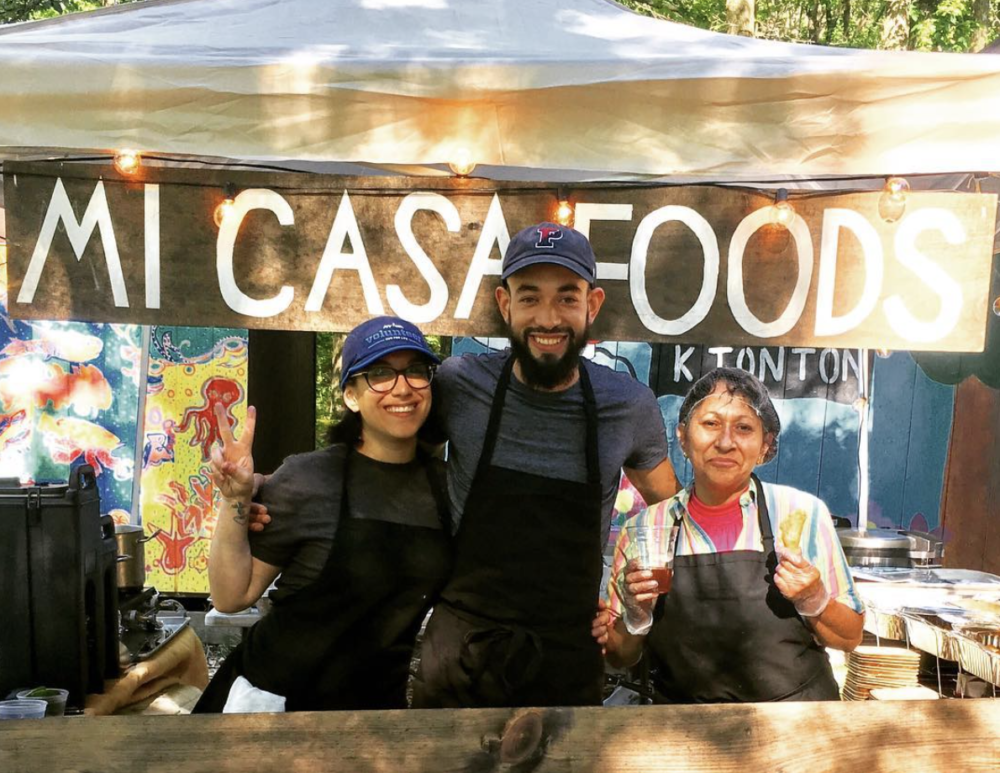
The team behind the family business Mi Casa Foods, who were among those who lost their home base (Photo courtesy of Mi Casa Foods, via Instagram)
Gothamist, which had obtained a copy of the membership contract, reported that the company had agreed to give its members 10 days’ notice if the company wished to terminate it. Eater reported that some Pilotworks members, who have not been able to contact the company’s management, are owed anywhere between $2,000 and $15,000 in outstanding payments from the distribution arm.
Last Wednesday, this reporter rang the bell to the Pilotworks office on the Pfizer building’s third floor but got no response, though chatter could be heard through the glass doors. Tessa Price, Mike Dee, and Zach Ware—the Pilotworks CEO, who took over in June—did not answer requests for comment from The Bridge, nor have top managers, including Nick Devane, made themselves available to the media. Instead, via a now defunct email address, a representative named Kirk Love directed The Bridge to the company’s statement on its website.
“It is with a heavy heart that after failing to raise the necessary capital to continue operations, Pilotworks will cease operations,” the statement reads. “This is a sad outcome for Pilotworks, the makers in our kitchens, and independent food in general. We wish there was another option to continue operating. Sadly, there was not.” The note was signed, “Regretfully, Pilotworks.”
The note left everyone hungry for an explanation. Prospective investigators will have plenty to sift through. In the mean time, multiple sources who spoke to The Bridge say that the widely speculated notion that the company simply expanded too quickly is just part of what went wrong.
“There were so many issues relating to how they spent their money,” said a former management-level employee who had signed a non-disclosure agreement upon being asked to leave the company and, thus, wished to remain anonymous. “There was a big tech team [that] worked on making a member portal where members could have a community board, but basically a lot of functionality that they made was completely unnecessary, and you could’ve gotten it from third parties.”
The source said there was no dialogue between the tech team and the members, nor did members think they even had a need for a tech team. “They were spending an insane amount on salaries for these people, which had nothing to do with the workings of the kitchen,” the source asserted about Devane and Dee.
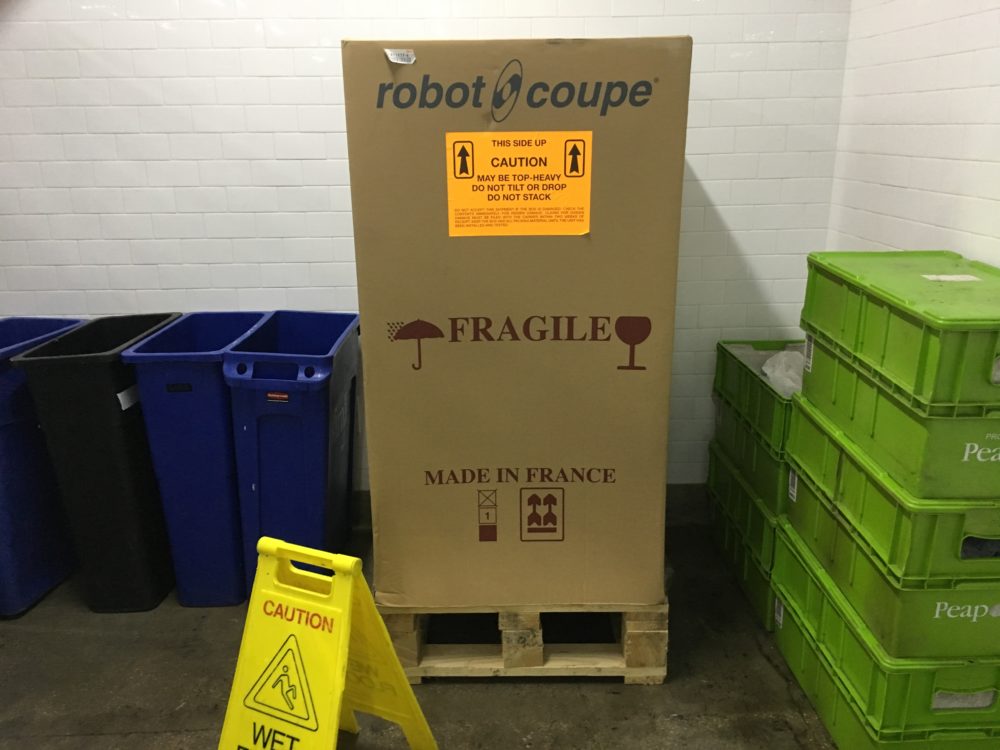
An the deserted Pilotworks, an expensive mixer/blender was still in its box. Members said it was an unnecessary expense (Photo by Michael Stahl)
Nick Devane was so “reckless with spending,” according to the source. He “wanted to move to L.A. because he liked surfing, and he tried to acquire a kitchen in L.A., but even when it didn’t work out, he opened a very expensive office in Venice.” (Little public information about such an office is available online, though one LinkedIn profile of a Los Angeles-based sales and outreach worker for Pilotworks notes the company’s presence in the city.) The source also said that Devane “got a company apartment in L.A.”
Over time, all of the previous staff from Brooklyn Foodworks were either fired or quit, the latter because, Sebastian Jaramillo said, they were poorly treated by the Pilotworks head honchos. Jaramillo also told The Bridge that, in meetings with Devane, he heard him describe the business model of Pilotworks in terms far different from its stated purpose of being a nourishing business incubator. “We can run it like a gym model: people sign up, most people won’t use most of their time and we can just cash in,” Jaramillo recalls Devane saying.
During the company’s burst of expansion, signs of strain began to show. In February, Zach Ware, a veteran of Zappos and Republic of Tea, was hired as the chief operating officer after a week of consulting for the company. In June, Ware stepped up to CEO while Devane stepped down from his leadership role to focus on “long-term creative and strategic initiatives,” according to a company statement, and has been living in Los Angeles.
By at least one account, Ware didn’t exactly impose stringent cost controls. According to the former management-level employee, Ware utilized company funds in “refabbing a lot of the kitchens because he wanted each kitchen to have the same layout … which I don’t think was necessary at all.”
Anke Albert, who owns Anke’s Fit Bakery and was clearing out her belongings from Pilotworks last week, said, “People had a feeling something was off with Pilotworks.” Albert founded her company in the Hamptons, where she still utilizes another kitchen to make her healthy baked goods. After her recent expansion into Pilotworks, she got a 40% boost in sales this year, which she fears could be flushed away. Like other members, Albert wonders whether Pilotworks expanded too fast, especially since the company hadn’t really mastered the maintenance of its Brooklyn kitchen. Equipment would break and not get fixed quickly; the distribution service was inefficient and slow, she said.
Was It Ambition, or Pressure?
What was Devane thinking, as the company rose and fell so quickly? “In my impression of him, I don’t think there was any intention of hurting any business, and I also don’t think in his mind there was any possibility that they were going to fail,” said April Wachtel, a former Pilotworks member and founder of Swig + Swallow, which produces bottled cocktail mixers. Wachtel is sympathetic to the plight of the Pilotworks members—after all, she’s one of them, and in the wake of the kitchen closing has built supportindependentfood.com to assist Pilotworks vendors in making helpful connections.
However, Wachtel told The Bridge she considers Devane a friend, and got to know him fairly well, especially after interviewing him on her podcast, Movers and Shakers, where he paints the classic picture of a kid who “grew up pretty poor” and toiled through lean years as he tried to make a name for himself in business and tech. Wachtel said there’s a chance Devane didn’t initially know about the legal ramifications of the Homemade model, and, in the early days of Pilotworks, excitement about the company was abundant in the kitchens.
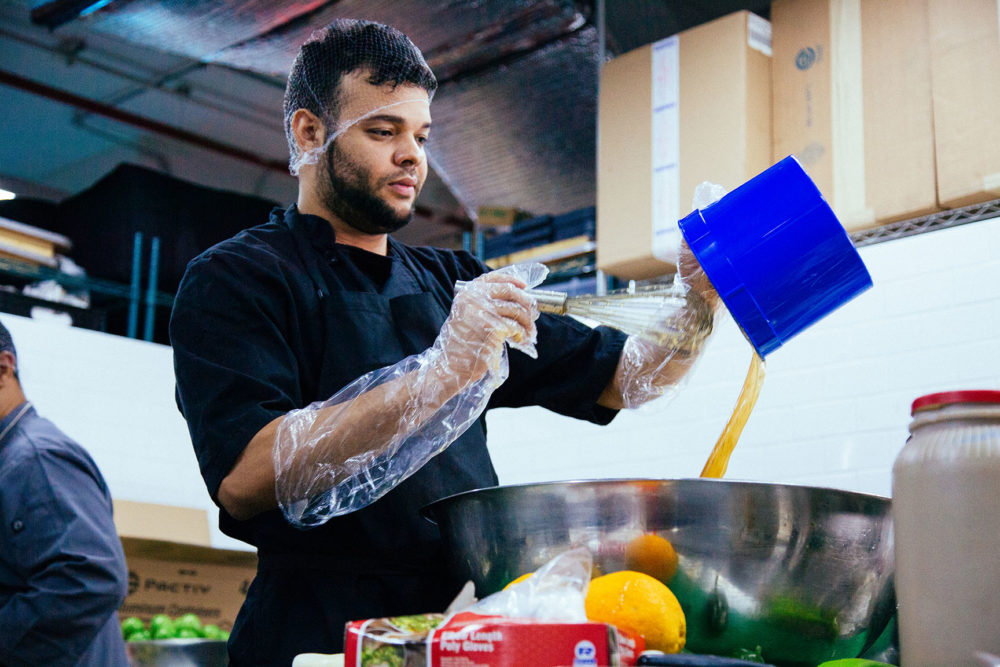
A member of the facility at one of its 16 workstations, back when it was still called Foodworks (Photo courtesy of Foodworks)
But when nearly two dozen investors sink more than $15 million into a business, they tend to want to see growth. Still unclear are the promises that Devane and Dee had made in that regard, or what pressure investors put on them to expand. What’s more certain is the duo had no previous experience at growing a business on that scale.
In a text, Wachtel wrote: “I just like to look for the learnings and positive ways to move forward. For me personally, the learning has been we will mostly not speak to VCs anytime soon and will try to raise from [angel investors], as this shows what [venture capitalists] can do to your business if you’re not ready to scale as quickly as they need.”
Acre Venture Partners, the capital investment arm of Campbell’s Soup, one of the lead investors in the Series A funding round for Pilotworks, declined to comment for this story. On Twitter, Alex Iskold of Techstars, which wound up being a second lead investor in that same funding round, appeared nonplussed by the shutdown, writing: “I am the luckiest guy to be an investor in 100 incredible startups. Nick Devane, Mike Dee and @PilotworksHQ will always have a special place in my heart. The journey ends but memories, inspiration and idea lives on. Thank you for everything Nick and Mike!”
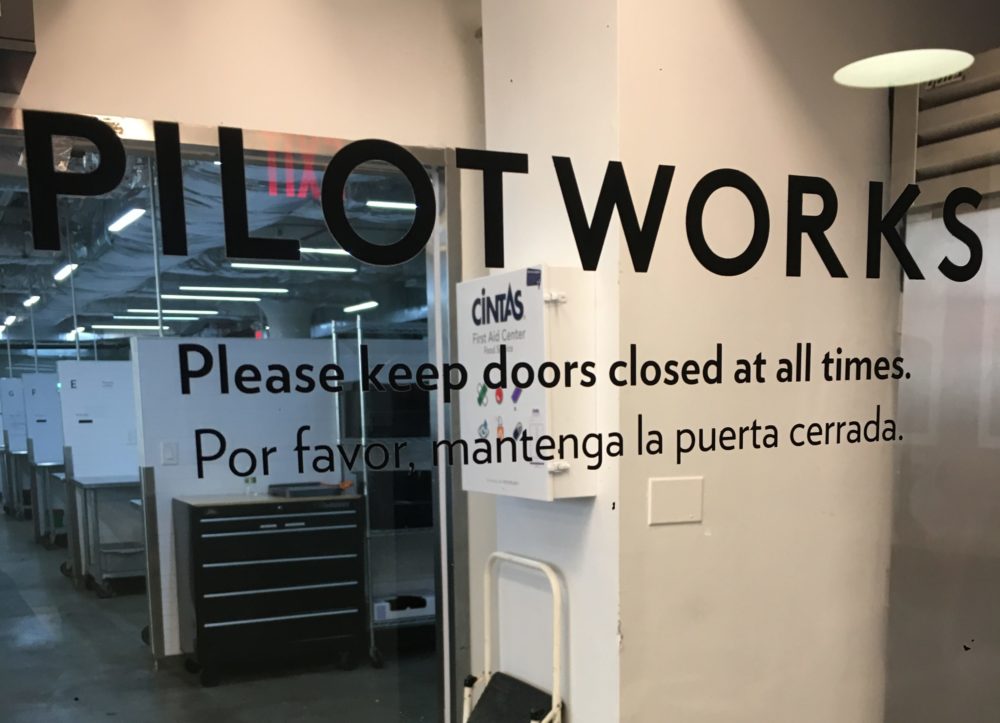
Now the doors are closed for good, unless a rescue can be engineered (Photo by Michael Stahl)
VCs tend to see a lot of flameouts. They go with the territory. But forgiveness and farewells don’t come as readily to the small-business owners affected by the kitchen’s closing. “Most people had to cancel all their orders for the week,” Sebastian Jaramillo says. After Pilotworks tossed his mother, Adriana, out of the building, the Mi Casa Foods tandem hurried to another kitchen space they found through their network and cooked through the night.
They were able to complete the order they were working on at Pilotworks, which was due the next afternoon, but called clients who’d placed orders for the next two weeks and told them they couldn’t deliver. “This is an incredible hit to a small business. For us, it’s $5,000 this week alone,” Jaramillo said last week.
Jaramillo, 29, had earlier been a co-founder and the kitchen-operations manager at Brooklyn FoodWorks. He helped design and build the second-floor kitchen, but soon after the Devane/Dee takeover, Jaramillo, unhappy with the way they were running the company, decided to leave his post and run Mi Casa Foods with his mother.
“This is my full-time job, this is my hustle. We took out business loans, we bought a car in order to make deliveries,” he says. “We sold $10,000 last year, we’re about to crack $150,000 this year.” They’d been making their signature empanadas by hand—from a three-generation-old family recipe—and producing about 200 a day. Then they were able to buy a machine that allowed them to cook 600 empanadas an hour. “We’re truly growing, and we were just stopped dead in our tracks,” Jaramillo says.
The Local Economic Fallout
Jaramillo estimates, conservatively, that the Pilotworks shutdown threw 500 jobs into peril across all the small businesses that worked out of the community kitchen, both the second-floor space and a 7,000-sq.-ft. facility on the fourth floor. For the politicians who backed the organization in its initial Brooklyn FoodWorks iteration, it’s a public debacle they’re anxious to fix.
City Council Member Robert Cornegy, who supported the original incubator’s opening in February 2016, was conspicuously frustrated about the situation in a phone interview last week with The Bridge. “I hate that we have to have this call, but it is what it is,” he said. “The cost of commercial space in this city has skyrocketed exponentially over the last two decades. The average entrepreneur, who we’re asking to come out of their basements, their kitchens, their garages, and become part of a vibrant economy, we were able to do that through this program. I was really proud of it, and proud that it was in my district, so to see it be disbanded in this way is a little disheartening.”
In a joint statement with Borough President Adams released Oct. 16, Cornegy added: “It is our hope that NYCEDC, who has overseen this project since its initial inception, will work to find another shared commercial kitchen operator to operate this incubator for the affected food manufacturers who have relied on this space for their businesses’ well-being.” Cornegy also said he still believes that private-public partnerships are “a new model” of good, local business development, and he had hoped that Brooklyn FoodWorks would emerge as an example for similar, future ventures to follow.
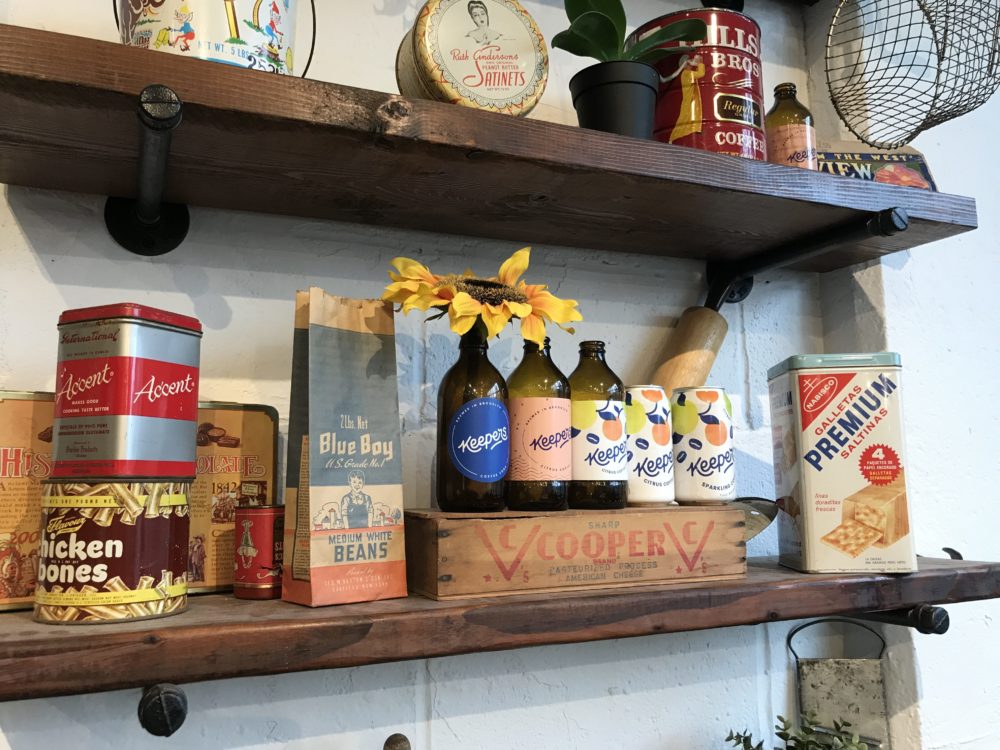
A year ago, the incubator was decorated with a playful spirit (Photo by Angelica Frey)
“Over the last two days I’ve focused my attention on trying to save these vendors,” Cornegy said, adding that he expects a “thorough investigation” into “fiscal malfeasance” at some point. Cornegy said he plans to speak about a prospective probe with the Council Member from District 15, Ritchie Torres, who is chairman of the Council’s committee on oversight and investigations.
Members not only need to find new kitchens, but also new means of distribution. Laura Shafferman, who founded Legally Addictive, which produces a chocolate-toffee-cracker treat, was once a tenant in the kitchen, but at the time of its closing solely utilized the Pilotworks distribution service. She said it had helped garner new customers, but just as her business’s most-important quarter of the year—the holiday season, vital to so many other companies—was beginning, Pilotworks failed her.
“I have no clue how this is going to go,” Shafferman said of the situation. “It’s a significant portion of our business, and now I’m scrambling to get in touch with all of our customers, hoping they’ll work with us directly; I’m trying to absorb all the dropped shipping that’s happening. And of course there’s the loss of payment from some of the invoices that were still outstanding.”
Shafferman said she had reasons for optimism, though. She is impressed with the fact that displaced Pilotworks residents have banded together and helped each other in procuring kitchen space and other opportunities. Equally encouraging is that other businesses have offered to help in any way they can. Shafferman said a staffer at Eataly, who subscribes to her newsletter, reached out to say, “We’ve got jobs available; if anyone in the kitchen doesn’t have a job send them to us.”
Hot Bread Kitchen, a shared commercial kitchen space in East Harlem, opened a hotline and set up a digital intake form for Pilotworks members so they could serve as matchmaker in finding a suitable kitchen for them, either in East Harlem or at other kitchens in their network. “I have a lot of empathy for what it takes to run a small business,” says Shaolee Sen, Hot Bread Kitchen’s executive director. “Just knowing that everybody would be in a scramble and having to contact a bunch of different places to find help immediately, we said we would set up this hotline so they could have one point of contact.”
Greene Grape Annex, a café in Fort Greene, offered its space for a group meeting for those affected by the closure, as did the Moore Street Market, an East Williamsburg indoor market sustained by the NYCEDC, which saw a session organized by Brooklyn Quality Eats last week.
All this outreach and support more accurately reflects what, to many, the Pilotworks kitchen was supposed to be about. “I was here from the beginning,” said Adriana Jaramillo last week as she emptied out the Mi Casa Food storage at Pilotworks.
“I love our business, our community,” she said. “I love this kitchen.”